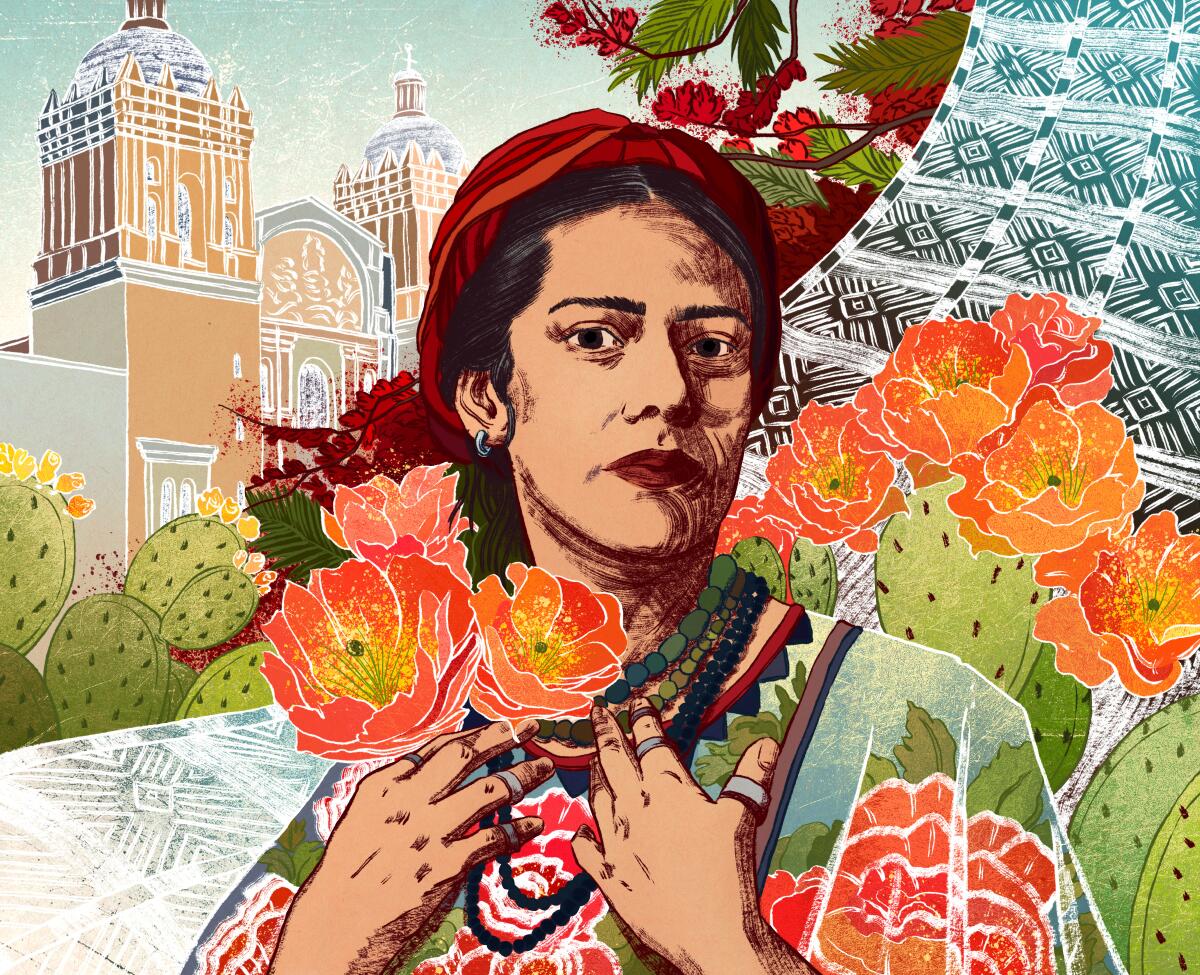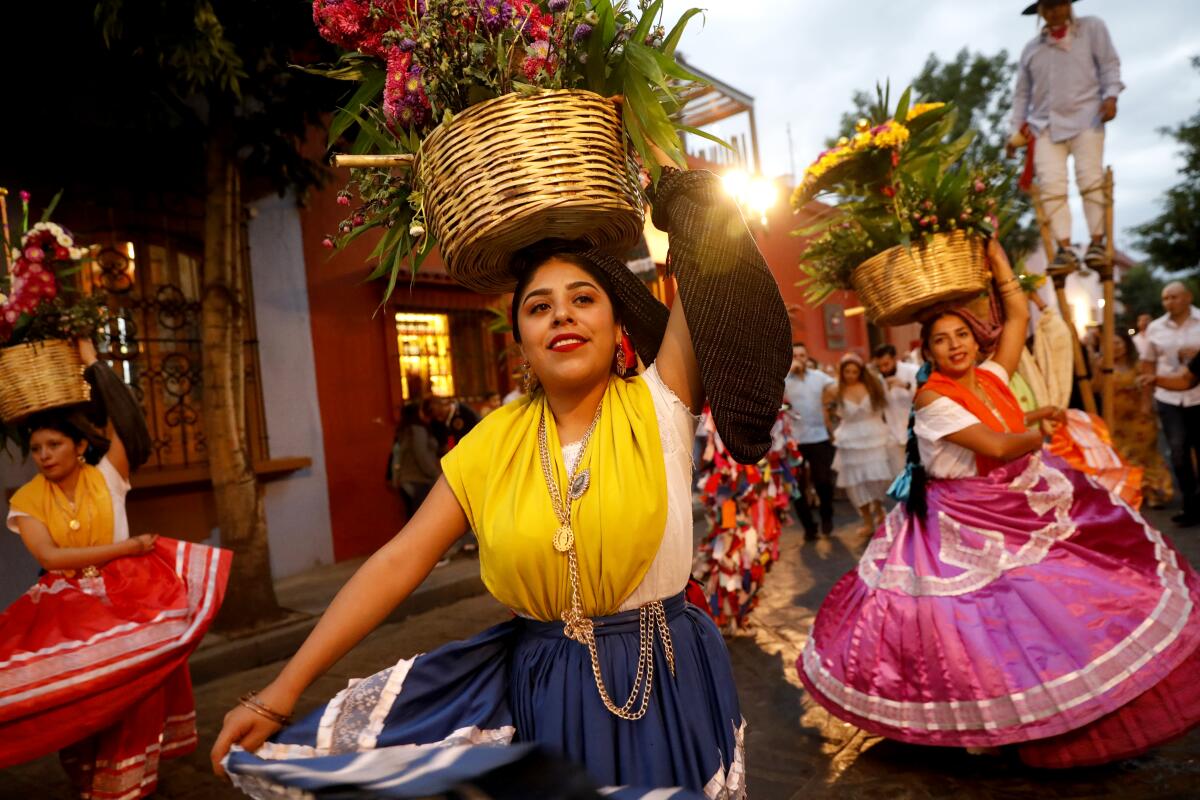Migration is a human condition -- for the people of the Americas, movement is propelled by survival

Since 2014, I have visited Oaxaca de JuĂĄrez twice a year: once in the summer, usually July, my birthday month, and once in the winter, just before or after Christmas. I visit Oaxaca because it has everything I crave of my homeland: folk art, music, dance and, especially, food. The sensory pleasures of Mexico keep me connected to a place I left behind when my family migrated to the U.S. I was 10 at the time. My memories live in Mexicoâs culture.
I visit Oaxaca because MichoacĂĄn, my home state, has become too dangerous over the years and I grew terrified of the possibility that one of my grandparents would be kidnapped or killed because they had a grandson in the U.S. who could be pressured to pay ransom. Oaxaca, where I have no relatives, is a bittersweet compromise. And although I think of it as paradise, it too is dealing with the conflicts that shattered the unity of my family: drug cartels competing for turf, indigenous populations fighting for land, communities struggling to remain intact as entire families migrate to the cities or cross the border in search of jobs.
Migration is a human condition, but for the people of the Americas movement is propelled by necessity and survival. Everywhere I have traveled this summer â through the American Southwest, Spain and, now, Mexico â I have encountered stories of people feeling displaced from their homelands or disappointed in their governments, so they have set out to build a new dream. No matter how imperfect or troubled that beginning may be, it is, at the very least, changing direction.
On social media, I post pictures of my meals, the embroidered shirts I purchase, the bright murals on the walls throughout the neighborhoods, but the exchanges I have with OaxaqueĂąos are heavy with anxiety: âWhat of those children in cages?â Iâm asked. âWhat of the raids? Is it true the president will throw all the Mexicans out?â But before we plummet into grief, something distracts our attention. If weâre lucky, it will be a calenda, a marching band parading down the cobblestones of Calle AlcalĂĄ. July is the month of the Guelaguetza, the folk dance festival, so calendas â with joyfully spinning giant puppets and paper spheres â are an everyday occurrence.
What drew me
Before choosing Oaxaca as my home away from home, I heard numerous accounts from acquaintances about its magic and beauty. But it was actually the songs of Lila Downs that convinced me. Oaxaca loves Downs as much as Downs loves Oaxaca. Her songs praise the culture but also celebrate its peopleâs resistance and struggles. Over the years her music has become more overtly political, as if keeping up with the stateâs social climate.
There are also two books that gave me early glimpses into the wonders I would eventually witness. Oliver Sacksâ âOaxaca Journalâ documents the vast variety of Oaxacaâs ferns but also delves into other areas, like the cultural significance of mezcal and edible insects. (My favorite snack is a handful of chapulines, grasshoppers cured with salt and lemon.) Sandra BenĂtezâs âNight of the Radishesâ tells the story of a woman haunted by the death of her twin sister as she sets out to locate her missing brother last seen in Oaxaca. BenĂtez offers a gorgeous description of the radish festival, which takes place on Dec. 23.
More recently, I was stunned by Peter Kuperâs graphic novel âRuins,â which is also available in a Spanish edition. The illustrations trace the journey of a monarch butterfly as it migrates to Mexico. At ground level, an American couple from New York City moves through Oaxaca, visiting sites like the pre-Columbian ruins of Monte AlbĂĄn, but also encountering the tensions of the city, like the teachersâ union demonstrations that continue to this day.
The city of Oaxaca has a reputation for doing everything bigger and better. It might appear that way because this World Heritage Site has preserved the grandeur of its Spanish colonial architecture and all 16 of its indigenous populations contribute to its labor force or come to sell their merchandise, everything from prickly pears to folk art. Santo Domingo, the church and former monastery, is surrounded by indigenous merchants in traditional dress calling tourists to their clothing and alebrije stands. Young people walk along the plaza taking selfies with their cellphones.
Though a number of Chicano writers come to Mexico, only a few explore in their work the past colliding with the present, the Chicano experience in the Mexican homeland. Sandra Cisnerosâ âCarameloâ charts a young womanâs emotional growth as she and her family travel back and forth from Chicago to Mexico City each summer. Maceo Montoyaâs âThe Deportation of Wopper Barrazaâ offers a humorous take on one manâs plight as heâs sent back to MichoacĂĄn, a place he hasnât seen since he was 3, and which he scarcely remembers. Daniel PeĂąaâs âBangâ tells the devastating story of a family of undocumented immigrants who suddenly find themselves caught in the dangerous arena of drug smugglers along the U.S.-Mexico border. And Reyna Grande, once an undocumented immigrant herself, has dedicated her entire body of work to highlighting border-crosserâs stories through her novels and memoirs, most recently âA Dream Called Home.â
On this trip to Oaxaca, I bring with me Oscar Casaresâ âWhere We Come From,â a novel that sheds light on human trafficking. Its points of view are startlingly arresting: an older woman and her young godson in Brownsville, Texas, who become the unlikely heroes in the rescue of a boy who has fled his captors. The contrast between the lives of the two boys, one an American citizen, the other an undocumented immigrant, forces readers like me to confront my privileges and to wonder what would have been my fate had my family never left Mexico.
As a visitor, I try not to romanticize my own country. The immigrant in me longs for positive reminders of home, but the writer in me latches on to complexities. In the three memoirs I have published, âButterfly Boy,â âAutobiography of My Hungersâ and âWhat Drowns the Flowers in Your Mouth,â I am the peripatetic narrator attached to the past yet always moving forward. The next place reminds me of the place before. I cannot change what has been, but I must remember so that my stories never succumb to silence, the precipice of forgetting.
I see the same urgency in the literature I have read or recollected on my journey this summer. No matter the cultural space or political landscape, writers examine the past and question the present in order to come to terms with the traumas that haunt our histories, our communities and our individual stories.

Home yet not home
Iâm sitting in el zĂłcalo, the town square, beneath the shadow of Oaxacaâs cathedral. I have purchased a pair of patchwork cloths by Tlacolula artist Jennifer Grijalva MartĂnez at the textile museum. The scenes depict the struggle of migration, a man praying for safety during his trek to the north. The woman behind the counter told me that there was a call for agricultural workers willing to relocate to Italy, where that labor force was becoming depleted. âMaybe theyâll appreciate our people more there than in the United States,â she said, indignantly.
As I continue to admire the textiles, a group of migrants from Central America pours into the square, begging for money and food. For every sympathetic encounter thereâs another tinged with disdain. (Thereâs a rumor that Mexico will soon open detention centers like those in the U.S.) A boy, about 7 years old, offers to shine my shoes. I want to ask him, âShouldnât you be at school?â but I hold my tongue, because thatâs a stupid observation to make. The realities of the world spin before me so swiftly, itâs dizzying.
A few minutes later, I meet up with a young poet from Veracruz who attended graduate school in the U.S. but dropped out and relocated to Oaxaca.
âWhy Oaxaca?â I ask.
She tells me she couldnât return to her home state, where she ran the risk of being kidnapped. My body grows cold, and I want to tell her that I too am exiled from my home state, but itâs too early in the morning for such sadness. âSo Oaxaca it will have to be for a while longer,â she says, resigned. Home and not home. We have endured that condition as Mexicans in the U.S. all this time.
Suddenly, the feeling that Iâll never go home again weighs heavily on me. But the purpose of all that traveling and all that reading wasnât to escape my reality, even though each city became a refuge. Each stopping point didnât take me farther away, it brought me one step closer to the place I left behind all those years ago because travel makes the world smaller, the foreign becomes familiar, and books keep teaching me that the so far away and the so long ago are always within reach.
Before I become further lost in thought, my friend from Veracruz unfolds a beautiful huipil from her bag and places it over her torso like shield. âBut look what I found,â she tells me, delighted with her purchase. Afterward, we navigate the morning crowds of el zĂłcalo as we head to a small restaurant across the market. The tablecloths are as colorful as the papel picado decorations that hang above. âThe food is delicious here,â she says. âItâs just like â.â The final word is drowned out by a marimba player who has set up his instrument at the entrance. His partner walks between tables collecting tips. These are the final days of my stay. Iâm exhausted of being on the road. Yesterday I dropped all my coins into the small bowl of a blind accordion player. I have nothing left to give.
More to Read
Sign up for our Book Club newsletter
Get the latest news, events and more from the Los Angeles Times Book Club, and help us get L.A. reading and talking.
You may occasionally receive promotional content from the Los Angeles Times.








